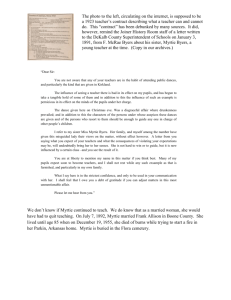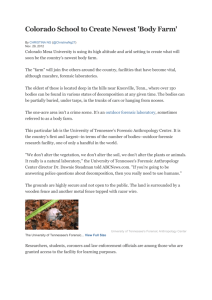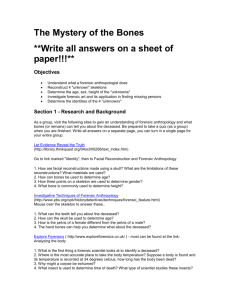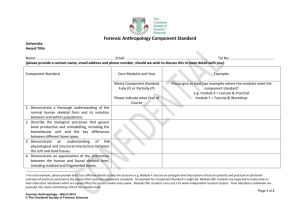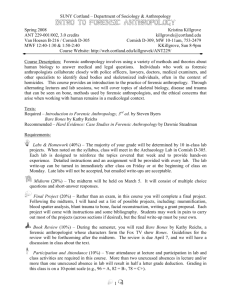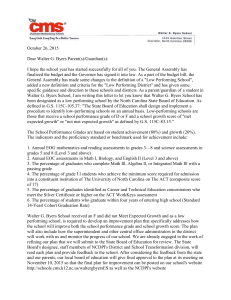Forensic Anthropology - School of Liberal Arts
advertisement
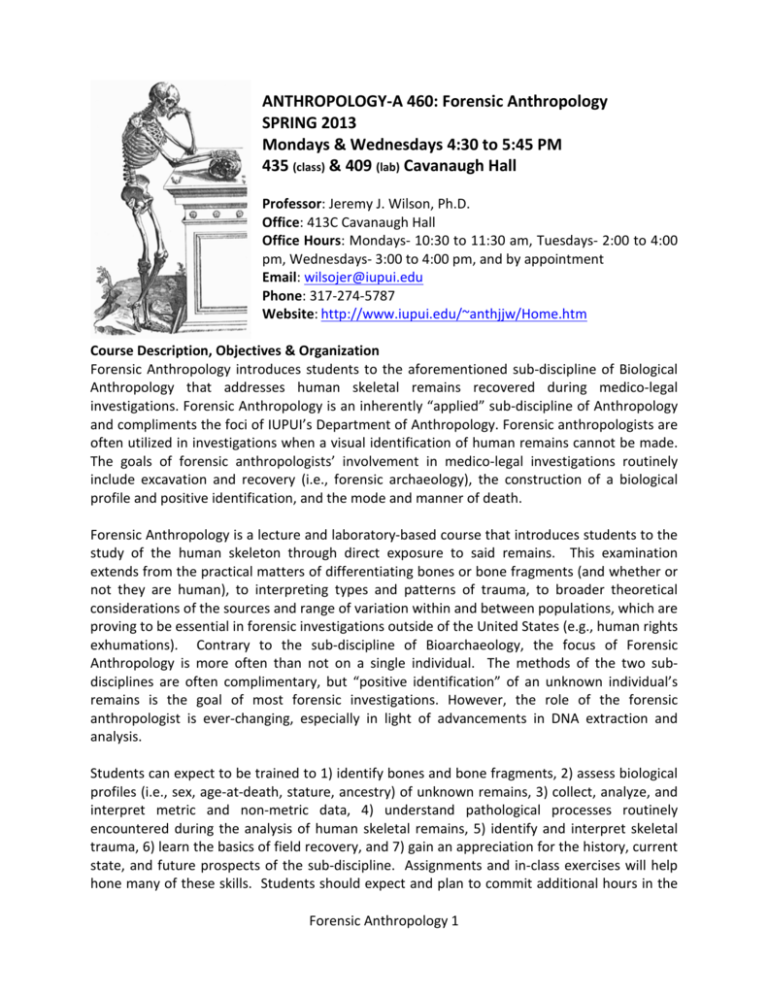
ANTHROPOLOGY-A 460: Forensic Anthropology SPRING 2013 Mondays & Wednesdays 4:30 to 5:45 PM 435 (class) & 409 (lab) Cavanaugh Hall Professor: Jeremy J. Wilson, Ph.D. Office: 413C Cavanaugh Hall Office Hours: Mondays- 10:30 to 11:30 am, Tuesdays- 2:00 to 4:00 pm, Wednesdays- 3:00 to 4:00 pm, and by appointment Email: wilsojer@iupui.edu Phone: 317-274-5787 Website: http://www.iupui.edu/~anthjjw/Home.htm Course Description, Objectives & Organization Forensic Anthropology introduces students to the aforementioned sub-discipline of Biological Anthropology that addresses human skeletal remains recovered during medico-legal investigations. Forensic Anthropology is an inherently “applied” sub-discipline of Anthropology and compliments the foci of IUPUI’s Department of Anthropology. Forensic anthropologists are often utilized in investigations when a visual identification of human remains cannot be made. The goals of forensic anthropologists’ involvement in medico-legal investigations routinely include excavation and recovery (i.e., forensic archaeology), the construction of a biological profile and positive identification, and the mode and manner of death. Forensic Anthropology is a lecture and laboratory-based course that introduces students to the study of the human skeleton through direct exposure to said remains. This examination extends from the practical matters of differentiating bones or bone fragments (and whether or not they are human), to interpreting types and patterns of trauma, to broader theoretical considerations of the sources and range of variation within and between populations, which are proving to be essential in forensic investigations outside of the United States (e.g., human rights exhumations). Contrary to the sub-discipline of Bioarchaeology, the focus of Forensic Anthropology is more often than not on a single individual. The methods of the two subdisciplines are often complimentary, but “positive identification” of an unknown individual’s remains is the goal of most forensic investigations. However, the role of the forensic anthropologist is ever-changing, especially in light of advancements in DNA extraction and analysis. Students can expect to be trained to 1) identify bones and bone fragments, 2) assess biological profiles (i.e., sex, age-at-death, stature, ancestry) of unknown remains, 3) collect, analyze, and interpret metric and non-metric data, 4) understand pathological processes routinely encountered during the analysis of human skeletal remains, 5) identify and interpret skeletal trauma, 6) learn the basics of field recovery, and 7) gain an appreciation for the history, current state, and future prospects of the sub-discipline. Assignments and in-class exercises will help hone many of these skills. Students should expect and plan to commit additional hours in the Forensic Anthropology 1 lab outside of regular class meeting times. Like other fields of scientific inquiry, the research and analyses performed during class will teach the students to formulate and test hypotheses, and subsequently justify their conclusions. Class meetings will provide time for lectures, discussions, hands-on learning and exercises with skeletal material. Following the first two weeks of class, approximately half of each class time will be devoted to sharpening your practical skills, conducting in-class exercises, and preparing for the quizzes and practical components of the midterm and final examinations. Prearranged lab hours (see below) will give students additional opportunities to work on their skill set and assignments. Attendance There is no doubt that the textbook contains a vast wealth of information. However, it is no substitute for your attendance and participation in a lab-based course like Forensic Anthropology. Attendance is mandatory. You will receive 10 attendance points if you have no more than three unexcused absences. After that you will lose one participation point for each absence. For example, if you have three unexcused absences you will receive all 10 points, but if you have four absences you will receive nine points, five absences receive eight points, and so on. Excused absences are documented illnesses, religious holidays, or an absence that is discussed with me prior to or immediately after the absence. Please be prepared to document absences that will be excused. Students who attend less than half a class session will not receive attendance points without my permission. I will consider excusing absences for other reasons (e.g., K-12 school breaks, etc.) on a case-by-case basis, so please contact me about such absences as soon as possible. Attendance will be taken at the beginning of each class meeting on a course roster that circulates through class. If you come in late, you must ensure that you sign this roster at the end of class; at the end of the semester I will not negotiate over the days you forgot to sign the attendance roster. I will not allow students to sign the roster if they arrive halfway through the class meeting; please discuss any delays outside your control with me (e.g., caught in traffic jam, but not an errant alarm clock). The exams will also be heavily weighted towards the material discussed in depth during class, so it behooves you to attend. A basic requirement of this course is that you will participate in class and conscientiously complete the readings, in-class exercises, and lab assignments. If you miss more than half our class meetings within the first four weeks of the semester without contacting me, you will be Forensic Anthropology 2 administratively withdrawn from the class. Administrative withdrawal may have academic and financial aid implications. Administrative withdrawal will take place after the full refund period, and if you are administratively withdrawn from the course, you will not be eligible for a tuition refund. If you have questions about the administrative withdrawal policy at any point during the semester, please contact me. Required Texts Byers, Steven N. 2011 Introduction to Forensic Anthropology (4th Edition). Upper Saddle River, NJ: Pearson. Steadman, Dawnie W. 2009 Hard Evidence: Case Studies in Forensic Anthropology (2nd Edition). Upper Saddle River, NJ: Prentice Hall. Course Grading The grading for the course is based on a series of six inclass lab exercises (30% total), two lab assignments (20% total), two bone quizzes (10% total), a midterm and final examination (30% total), a group Daubert report and presentation on forensic anthropology methods (5%), and attendance (5%). The Midterm (March 6th) and Final (May 1st) will be conducted during designated class times. Both tests will include objective and essay components. The final will be cumulative, but it will primarily focus on the materials from the second half of the semester. The details and group assignments for the Daubert report and presentation will be expanded upon in the coming weeks. You can check your grades during the semester by logging onto Oncourse. Course Grading Scale A 92-100 B+ A89-91 B B- 86-88 82-85 79-81 C+ C 76-78 70-75 D F 60-69 0-60 Open Lab Time In addition to the scheduled class time, you are encouraged to spend a minimum of one to two additional hours in the lab each week. This is especially true in advance of quizzes, the exams, and the due dates for your take-home assignments. The open lab schedule is listed below. Please clear all visitors to the lab with me prior to their entry. The lab is not a social gathering site. Forensic Anthropology 3 Open Lab Schedule for Spring 2013 Mondays 2:00 to 4:30 pm Tuesdays 10:00 am to 2:00 pm Wednesdays 11:00 am to 3:00 pm Thursdays by arrangement Fridays by arrangement Professional Conduct Most of the skeletal materials that you will handle in the lab are not casts- they are human remains. You must demonstrate the utmost respect for these remains at all times in both your words and actions. Inappropriate behavior and/or comments will not be tolerated. You will be asked to leave the lab immediately and required to meet with me prior to your re-admittance to the class. Careful handling is also mandatory. Always carry bones with two hands and use the table padding and/or bean bags whenever you place material on a table. Please do not put pens or pencils near the bones or draw on them. Water bottles are permissible in the lab and around the human remains, but I strongly discourage eating or drinking in the immediate vicinity of any bones. Skeletal remains are never to leave the lab or classroom. Students who abuse, steal, or intentionally damage the remains will be expelled from the class. Policies For better or worse, life happens! As a result, I try to be as accommodating as possible. However, you need to keep me informed. Please feel free to discuss any problems you are having in class, whether they are related to illnesses, work schedules, problems with your car, or the wide range of reallife things that can happen over a semester. I will do my very best to help in whatever way I can. If you have questions or concerns, I can always be contacted before or after class. You can also schedule an appointment. Outside of class time, the most reliable means to contact me is electronically. I check my email virtually every day. On that note, please contact me via email (wilsojer@iupui.edu) and not Oncourse, which I check less frequently and can be somewhat unpredictable. The classroom is a safe-speech environment. It is your responsibility to treat other classmates fairly and with mutual respect, even if they have the audacity to disagree with you, champion an opinion that is inconsistent with your worldview, or simply bore you. Anyone who talks when someone else is talking, is hostile, or otherwise violates classroom etiquette (e.g., does other homework, reads the newspaper) will be considered to be in violation of this policy. Students who fail to adhere to these guidelines will be asked to meet with me before returning to class. Forensic Anthropology 4 This syllabus includes deadlines for assignments, exercises, quizzes, and test dates. Therefore, it is your responsibility to know when assignments are due, exercises are held, and quizzes and tests are scheduled. If there are any changes made in the syllabus, they will be posted on Oncourse and announced in class. Please do not wait until after an assignment deadline or exam date to talk to me. Likewise, do not postpone talking to me if you are having any difficulty with the class. Make-up tests will be essay tests. All work in the course is conducted in accordance with the University’s academic misconduct policy. Cheating includes dishonesty of any kind with respect to exams or assignments. Plagiarism is the offering of someone else’s work as your own: this includes taking un-cited material from books, web pages, or other students, turning in the same or substantially similar work as other students, sneaking a peek at the neighbor's exam, or failing to properly cite other research. If you are suspected of any form of academic misconduct you will be called in for a meeting at which point you will be informed of the accusation and given adequate opportunity to respond. A report will be submitted to the Dean of Students, who will decide on further disciplinary action. Please consult the University Bulletin’s academic misconduct policy or me if you have any questions. The Office of Adaptive Educational Services (AES) ensures that students with disabilities receive appropriate accommodations from the University and their professors. Students must register with the AES office in order to receive such services. Portable electronic devices, namely cell phones, should be turned off before entering the classroom. You can use a laptop in class to take notes, but please turn off the speakers. Do not surf the web in class. Let me know in advance if you carry around a communication device for familial reasons (e.g., pregnancy monitoring, disabled family, or contact with kids). Anyone whose electronic device disturbs class repeatedly will be asked to meet with me after class if they continue to disturb the group. Forensic Anthropology 5 Course Schedule Week 1 Week 2 Week 3 Week 4 Week 5 Week 6 Week 7 Topic(s) Readings & Exercises January 7th No Class: Dr. Wilson @ National Science Foundation N/A January 9th Introductions & Course Preview Steadman, pp. 1-7; Chapter 1 A History of Forensic Anthropology Byers, pp. 1-8 January 14th Forensic Anthropology in the 21st Century: Science & Jurisprudence Byers, pp. 8-11; Steadman, Chapters 6 &7 January 16th Reference Samples & Quantitative Methods Byers, pp. 11-26 January 21st No Class: MLK Jr. Holiday N/A January 23rd Human Osteology I: Cranium & Dentition Byers, Chapter 2 January 28th Human Osteology II: Axial & Appendicular Skeleton Byers, Chapter 2 In-class Exercise #1 January 30th Forensic Context I: Human vs. Nonhuman Byers, pp. 52-64 February 4th Forensic Context II: Antiquity of Remains Byers, pp. 64-74; Steadman, Chapter 21 Quiz #1 February 6th Initial Processing Byers, Chapter 6 February 11th Inventory & Commingling Steadman, Chapters 9 & 22 February 13th Estimation of Sex I: Non-metric analyses Byers, Chapter 8 February 18th Estimation of Sex II: Metric analyses Byers, Chapter 8 In-class Exercise #2 February 20th Adult Age Estimation I: The Pelvis Byers, pp. 190-200 Quiz #2 Forensic Anthropology 6 Week 8 Week 9 Week 10 Week 11 Week 12 Week 13 Week 14 February 25th Adult Age Estimation II: Cranium & Post-cranium Byers, pp. 200-212 In-class Exercise #3 February 27th Sub-adult Age Estimation I: Dental Development & Eruption Byers, pp. 174-190 March 4th Sub-adult Age Estimation II: Long bone length & epiphyseal fusion March 6th Midterm Examination March 11th Spring Break: No Classes March 13th Spring Break: No Classes March 18nd Stature Estimation Byers, Chapter 1 In-class Exercise #4 March 20th Ancestry Estimation Byers, Chapter 7 Steadman, Chapters 8 & 14 Assignment #1 Due March 25th Antemortem Skeletal Conditions Byers, Chapter 15 March 27st Death & Skeletal Trauma Byers, Chapter 11 Steadman, Chapter 15 April 1st Gunshot Trauma Byers, Chapter 12 April 3rd Blunt-Force Trauma Byers, Chapter 13 Steadman, Chapter 17 In-class Exercise #5 April 8th Sharp-Force Trauma & Post-mortem Alterations Byers, Chapters 14 & 16 Steadman, Chapter 12 April 10th No Class: AAPA Meetings Forensic Anthropology 7 N/A Week 15 Week 16 Week 17 April 15th Individualization & Positive Identification Byers, Chapters 17 & 18 Steadman, Chapters 3 & 20 April 17st Recovery Scene Methods Byers, Chapter 4 Steadman, Chapters 5 & 11 In-class Exercise #6 April 22nd Estimating Postmortem Interval Byers, Chapter 5 Steadman, Chapter 13 Assignment #2 Due April 24th Mass Disasters & Human Rights Investigations Byers, Chapter 19 Steadman, Chapters 23 & 24 April 29th Daubert Group Presentations N/A Final Exam in CA 435 on Wednesday, May 1st from 3:30 to 5:30 pm Forensic Anthropology 8

